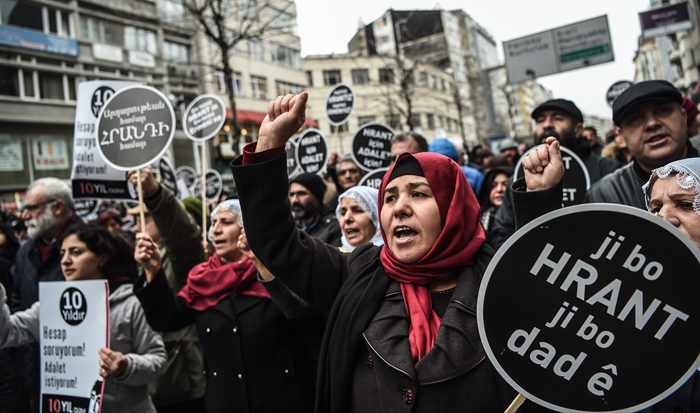An İstanbul court on Friday ruled to hear 51 more people in the case of Turkish Armenian journalist Hrant Dink, who was assassinated in 2007, DHA reported.
According to the decision, which came on the 10th anniversary of the assassination, the court will hear 51 witnesses including former Interior Minister Muammer Güler, former police chiefs Hanefi Avcı, Emin Arslan, Bülent Köksal, Recep Güven and Selim Kutkan, and journalist Nedim Şener.
The court also denied requests for the release of former police chiefs Ali Fuat Yılmazer and Ramazan Akyürek. The next hearing in the case is scheduled for Feb. 6.
During a commemoration ceremony for slain Turkish Armenian journalist Hrant Dink on the 10th anniversary of his assassination, his wife Rakel Dink said on Thursday in İstanbul that the perpetrator of the murder was the state since the case has not yet been solved.
“Obviously the perpetrator of this murder was the state with its all layers. The people do not need anything more to realize this, having seen all the disgraceful things that have unfolded in the last 10 years,” Rakel Dink said, adding that the state must cleanse itself of the rotten apples.
The investigation into Hrant Dink’s assassination, which took place in front of the Armenian weekly Agos on Jan. 19, 2007, has become even more complicated with new claims. Directing attention to controversial remarks about the murder, Dink said first it was a couple of nationalist youngsters, then “FETÖ,” a derogatory term used by the government for the Gülen movement. Rakel Dink also noted that for a while, officials pretended that the perpetrator of her husband’s murder was Ergenekon, aka the deep state.
Rakel Dink reiterated that Hrant Dink’s murder is not unsolved since the perpetrator is known.
Dink, then editor-in-chief of the Agos weekly, was killed by a 17-year-old named Ogün Samast, who came from Trabzon province to kill him after a systematic smear campaign had been waged against Dink due to his distorted remarks on Turks and the incidents of 1915. The state is accused of negligence, not providing him security and even threatening him through undercover intelligence officials before his assassination.
The 1915 incidents refer to the killing of Anatolian Armenians during World War I. While Armenia claims the killings were tantamount to genocide, Turkey categorically rejects the claim and says the killings were a result of the circumstances of the war.

